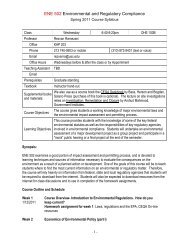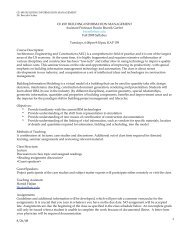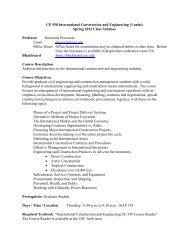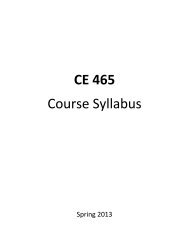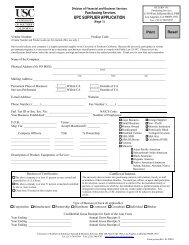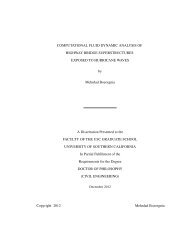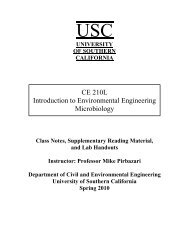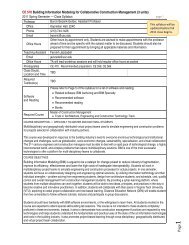Course Syllabus - USC
Course Syllabus - USC
Course Syllabus - USC
You also want an ePaper? Increase the reach of your titles
YUMPU automatically turns print PDFs into web optimized ePapers that Google loves.
CE 484 Water Treatment Design (3 units)<br />
2011 Fall Semester — <strong>Course</strong> <strong>Syllabus</strong><br />
Lecture Wednesday 6:30-9:10 pm KAP 141<br />
Professor<br />
Office KAP 203<br />
Dr. Arturo Burbano<br />
Phone (626) 376-5941<br />
Email<br />
Office Hours<br />
Prerequisites<br />
Textbook(s)<br />
Other Materials<br />
Other References<br />
<strong>Course</strong> Description<br />
(from Catalogue)<br />
<strong>Course</strong> Objectives<br />
Learning Objectives<br />
burbanop@usc.edu arturo.burbano@mwhglobal.com<br />
5:30-6:30 Wednesday<br />
CE 451 Water Resources Engineering (3, Sp)<br />
CE 463L Water Chemistry and Analysis (3, Sp)<br />
CE 473 Engineering Law, Finance and Ethics (3, Fa)<br />
Kawamura, Susumu. Integrated Design and Operation of Water Treatment<br />
Facilities, 2 nd Ed., John Wiley and Sons, Inc., 2000.<br />
Supplementary class notes and design documents will be provided during the<br />
course.<br />
MWH, Water Treatment: Principles and Design, 2 nd . Ed., John Wiley and Sons,<br />
Inc., 2005<br />
Pre-design studies, precipitation softening, coagulation and flocculation,<br />
sedimentation, filtration, sludge handling, chlorination, chloramination,<br />
ozonation; plant hydraulics, flow measurement, pumps, instrumentation and<br />
control, tertiary treatment. Prerequisite: CE 451 Water Resources Engineering,<br />
CE 463L Water Chemistry and Analysis, CE 473 Engineering Law, Finance and<br />
Ethics.<br />
Study the principles and design of water treatment processes, including<br />
coagulation, flocculation, sedimentation, filtration, disinfection (chlorination,<br />
chloramination, ozonation), advanced oxidation, and membrane filtration. To<br />
study different phases of water treatment design, regulations pertaining to<br />
drinking water, and contemporary topics such as DBP control, emerging<br />
contaminants, and water regulations.<br />
Familiarize the student with the fundamentals of the treatment technologies and<br />
the considerations for its design and implementation in water treatment plants.<br />
Policies on:<br />
Late work 10% daily penalty<br />
Make-up work TBD<br />
Incomplete work Partial credit<br />
Extra credit TBD<br />
Final grade schema is based on the following percentages of graded coursework :<br />
Homework 10 %<br />
Quiz %<br />
Quiz %<br />
Midterm 1 25 %
CE 484 Water Treatment Design (3 units)<br />
2011 Fall Semester — <strong>Course</strong> <strong>Syllabus</strong><br />
Midterm 2 %<br />
Midterm 3 %<br />
Paper(s) %<br />
Presentation 15 %<br />
Final Project %<br />
Final Exam 50 %<br />
Participation %<br />
Total 100 %<br />
Class Schedule<br />
Week WED Topics Assignments 1 Problems Due Dates<br />
1 8/24 Water Treatment and Design Fundamentals 1-13<br />
2 8/31 Feasibility, Bench, and Pilot Studies 15-22<br />
3 9/07 Pre-Design and Design Phases 36-56; 59-73<br />
4 9/14 Water Treatment Regulations 27-36 X<br />
5 9/21 Chemical Dosing 343-367 X<br />
6 9/28 Coagulation, Flocculation, Sedimentation – Part I 74-101 X<br />
7 10/05 Coagulation, Flocculation, Sedimentation – Part II 105-184 X<br />
8 10/12 Mid-term -<br />
9 10/19 Filtration – Part I 194-229 X<br />
10 10/26 Filtration – Part II 230-290 X<br />
11 11/02 Disinfection and DBP analysis 292-318 X<br />
12 11/09 Activated Carbon Adsorption 569-577 X<br />
13 11/16 Membrane Processes (MF, UF, RO) 583-591 X<br />
14 11/23 Waste Handling and Disposal 372-400 X<br />
15 12/30 Advanced Oxidation & Emerging Contaminants - X<br />
16 12/07 Final Exam -<br />
1 Reading assignments will be made from the textbook.
CE 484 Water Treatment Design (3 units)<br />
2011 Fall Semester — <strong>Course</strong> <strong>Syllabus</strong><br />
STATEMENT ON ACADEMIC INTEGRITY<br />
<strong>USC</strong> seeks to maintain an optimal learning environment. General principles of academic honesty include the concept<br />
of respect for the intellectual property of others, the expectation that individual work will be submitted unless<br />
otherwise allowed by an instructor, and the obligations both to protect one’s own academic work from misuse by<br />
others as well as to avoid using another’s work as one’s own.<br />
All students are expected to understand and abide by these principles. SCampus, the Student Guidebook, contains<br />
the Student Conduct Code in Section 11.00, while the recommended sanctions are located in Appendix A:<br />
http://www.usc.edu/dept/publications/SCAMPUS/gov/<br />
Students will be referred to the Office of Student Judicial Affairs and Community Standards for further review, should<br />
there be any suspicion of academic dishonesty. The Review process can be found at:<br />
http://www.usc.edu/student-affairs/SJACS/<br />
STATEMENT FOR STUDENTS WITH DISABILITIES<br />
Any student requesting academic accommodations based on a disability is required to register with Disability<br />
Services and Programs (DSP) each semester. A letter of verification for approved accommodations can be obtained<br />
from DSP. Please be sure the letter is delivered to me (or to TA) as early in the semester as possible.<br />
DSP Contact Information<br />
Location: STU 301<br />
Hours open:<br />
8:30 a.m. until 5:00 p.m., Monday — Friday<br />
Phone number: (213) 740-0776


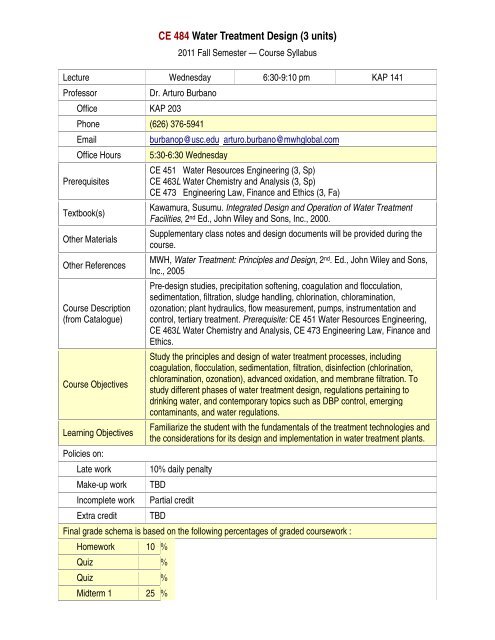
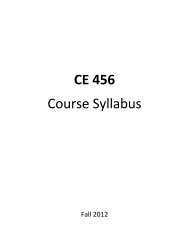
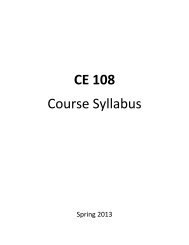
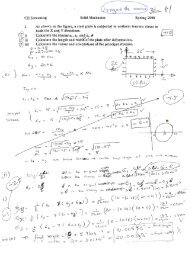
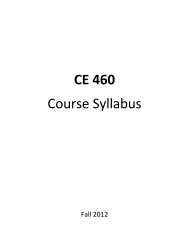
![Dr. Yan Xiao Bamboo Road Bridge can Support 16-Ton[ne] - USC](https://img.yumpu.com/37910641/1/190x245/dr-yan-xiao-bamboo-road-bridge-can-support-16-tonne-usc.jpg?quality=85)
